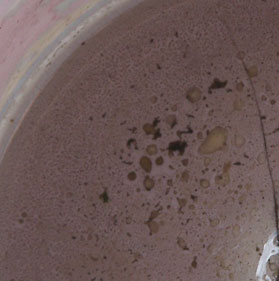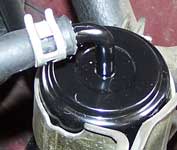Just a quick mention on Fuel Filters. This is common for every Fuel Injection system ever made and therefore I have not created links in the descriptions of each system to the fuel filter. I would just write the same thing in nearly every one anyway.
Clean fuel is absolutely critical to the proper operation of Fuel Injection systems, no matter if they are EFI, CIS or diesel. Each system has a specific fuel filter built to do the task of filtering the very tiny particles of dirt from the fuel. Some systems need a finer micron capability as in diesels and CIS. EFI can take slighter bigger particles through the system without really harming anything. When replacing fuel filters, make absolutely sure all the connections are clean before you break them and observe the safety precautions. On re-assembly ensure no dirt is introduced into the system and use clean tools. Do not try and fit filters from other makes to your car just because they are cheaper. Some do not work and can cause surge problems. In high pressure systems as in CIS, definately do not substitute the filters with inferior quality. Back in the day, I was changing the fuel filter every 20,000Km minimum. There were quite a few fuel companies and service stations that had contaminated fuel in the 80's and if you only changed the fuel filter when the manufacturer recommended to, then you would pay the price later. YES, some filters are very expensive, but the repair cost associated with dirty fuel is ten times more. These days the problem has been nowhere near as bad, thank goodness, because a lot of filters are now inside the fuel tanks as part of the fuel pump assembly. This makes changing them frequently very expensive. I personally don't agree with this trend, mainly due to this reason. An external filter to the fuel tank makes for much easier for diagnostic purposes.
Ensure the connections are tight and use the correct rated fuel lines and clamps. Make sure you fit the filter the right way around. The filter will generally have an arrow on it to show the direction of flow. If you fit it incorrectly the filter will block much quicker and may in some vehicles cause surging. This will generally lead to someone making an incorrect diagnosis of the problem and you paying lots of money for this mistake. Use genuine if you can afford it, but you will probably find that Ryco, Valvoline, Fram, Sakuru and other reputable filter makers are the makers of the genuine one anyway. Do not attempt to clean the filter and re-use it, sounds like a brilliant idea, right! I have seen it attempted with no success.
Below is a picture of a sample of fuel from the discharge side of the filter after only 30,000kms back in 2004. Although you can't notice it because it is spreadout over the bottom of the container, the fuel was a murky brown as it drained from the filter. There is plenty of water present and the tiny brown spots everywhere are very small dirt particles. The filter was quite difficult to blow through with my mouth. This is why I say, check or change your filter fairly regularly. You can gauge the interval yourself if you do your own servicing. Take the filter out and drain it from the discharge side into a clean container at 20-30K, observe the colour as it drains. If it is discoloured, change the filter, as it should be perfectly clean and the same colour as the fuel you put in the tank.

The bottom photo is from a job I did recently. I was amazed to see a spring loaded clamp used on an EFI fuel filter. If you own one of these then get rid of them and replace with good quality fuel injection hose clamps.
